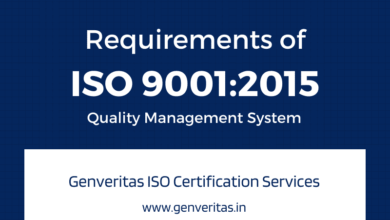A Guide to Obtaining ISO Certification in India

ISO certification is an important factor for businesses to demonstrate their ability to provide quality products and services. This certification is granted by the International Organization for Standardisation, an independent organisation that provides standards for businesses worldwide. In order to obtain ISO certification in India, there are certain prerequisites that must be followed.
Choosing the Type of ISO Certification
The first step towards ISO certification is to choose the appropriate type of certification for your business. Some of the options available include ISO 9001 2008 for Quality Management, ISO 14001 for Environmental Management, ISO 27001 for Information Security Management, and ISO 22008 for Food Safety Management, among others.
Selecting an ISO Certification Body
It is important to note that ISO does not provide certification to companies; it is done by external bodies. It is essential to choose a recognized and credible certification body for the process. When selecting an ISO registrar, consider evaluating several service providers, checking if they follow CASCO standards, and verifying their accreditation status. Although accreditation is not mandatory, the certification body should meet the requirements of ISO Accreditation bodies.
ISO certification has become increasingly important for businesses in terms of delivering high-quality goods and services and improving overall efficiency. Here are the steps involved in the ISO certification process in India:
- Create an Application/Contract The applicant and the registrar must agree on a contract that defines their rights and obligations, including liability issues, confidentiality, and access rights.
- Quality Documents Review The ISO auditor will review all quality manuals and related documents to identify any gaps against the ISO standards.
- Make an Action Plan Prepare a plan to eliminate the identified gaps and bring desired changes to the organization. Training may be required for employees to adapt to new procedures.
- Initial Certification Audit The initial certification audit consists of Stage 1 and Stage 2 audits.
- Stage 1: The auditor will audit the changes made by the organization and identify possible non-conformities, which will be divided into minor and major categories. The applicant must address these non-conformities.
- Stage 2: After the required changes have been made, the auditor will conduct a final audit to check if all non-conformities have been eliminated as per ISO standards.
- Completing the ISO Certification After all non-conformities are addressed, the registrar will grant the ISO certification.
- Surveillance Audits Surveillance audits are conducted periodically to ensure that the ISO quality standards are maintained.
Costs Involved The cost of ISO certification varies for each organization, depending on factors such as the number of employees, processes, level of risk, complexity of the management system, and number of working shifts. The ISO certification agency calculates the cost separately for each organization.
Choosing the Type of ISO Certification Before beginning the ISO certification process, you need to choose the appropriate type of certification for your business. Some examples of ISO certification include ISO 9001 for Quality Management, ISO 14001 for Environmental Management, and ISO 27001 for Information Security Management. It’s important to choose a recognized and credible certification body that follows CASCO standards and is accredited or meets the requirements of ISO Accreditation bodies.






